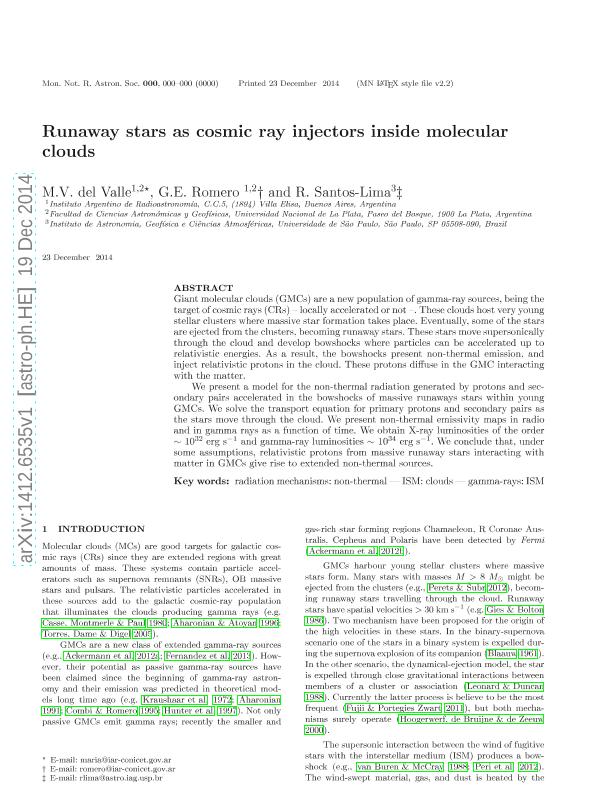Mostrar el registro sencillo del ítem
dc.contributor.author
del Valle, Maria Victoria

dc.contributor.author
Romero, Gustavo Esteban

dc.contributor.author
Santos Lima, R.
dc.date.available
2016-08-10T17:20:14Z
dc.date.issued
2015-03
dc.identifier.citation
del Valle, Maria Victoria; Romero, Gustavo Esteban; Santos Lima, R.; Runaway stars as cosmic ray injectors inside molecular clouds; Wiley; Monthly Notices of the Royal Astronomical Society; 3-2015
dc.identifier.issn
0035-8711
dc.identifier.uri
http://hdl.handle.net/11336/7057
dc.description.abstract
Giant molecular clouds (GMCs) are a new population of gamma-ray sources, being the target of cosmic rays (CRs) – locally accelerated or not –. These clouds host very young stellar clusters where massive star formation takes place. Eventually, some of the stars are ejected from the clusters, becoming runaway stars. These stars move supersonically through the cloud and develop bowshocks where particles can be accelerated up to relativistic energies. As a result, the bowshocks present non-thermal emission, and inject relativistic protons in the cloud. These protons diffuse in the GMC interacting with the matter.
We present a model for the non-thermal radiation generated by protons and secondary pairs accelerated in the bowshocks of massive runaways stars within young GMCs. We solve the transport equation for primary protons and secondary pairs as the stars move through the cloud. We present non-thermal emissivity maps in radio and in gamma rays as a function of time. We obtain X-ray luminosities of the order ∼ 1032 erg s−1 and gamma-ray luminosities ∼ 1034 erg s−1
. We conclude that, under some assumptions, relativistic protons from massive runaway stars interacting with matter in GMCs give rise to extended non-thermal sources.
dc.format
application/pdf
dc.language.iso
eng
dc.publisher
Wiley

dc.rights
info:eu-repo/semantics/openAccess
dc.rights.uri
https://creativecommons.org/licenses/by-nc-sa/2.5/ar/
dc.subject
Nonthermal Mechanisms
dc.subject
Clouds
dc.subject
Cosmic Rays
dc.subject
Gamma Rays
dc.subject
Radiation Mechanisms
dc.subject
Interstellar Medium
dc.subject.classification
Astronomía

dc.subject.classification
Ciencias Físicas

dc.subject.classification
CIENCIAS NATURALES Y EXACTAS

dc.title
Runaway stars as cosmic ray injectors inside molecular clouds
dc.type
info:eu-repo/semantics/article
dc.type
info:ar-repo/semantics/artículo
dc.type
info:eu-repo/semantics/publishedVersion
dc.date.updated
2016-07-26T15:12:40Z
dc.journal.pais
Reino Unido

dc.journal.ciudad
Londres
dc.conicet.avisoEditorial
This article has been accepted for publication in MNRAS ©: 2015 The Authors Published by Oxford University Press on behalf of the Royal Astronomical Society. All rights reserved.
dc.description.fil
Fil: del Valle, Maria Victoria. Consejo Nacional de Investigaciones Científicas y Técnicas. Centro Científico Tecnológico la Plata. Instituto Argentino de Radioastronomia (i); Argentina. Universidad Nacional de la Plata. Facultad de Ciencias Astronómicas y Geofísicas; Argentina
dc.description.fil
Fil: Romero, Gustavo Esteban. Consejo Nacional de Investigaciones Científicas y Técnicas. Centro Científico Tecnológico La Plata. Instituto Argentino de Radioastronomia (i); Argentina. Universidad Nacional de la Plata. Facultad de Ciencias Astronómicas y Geofísicas; Argentina
dc.description.fil
Fil: Santos Lima, R.. Universidad Nacional de la Plata. Facultad de Ciencias Astronómicas y Geofísicas; Argentina
dc.journal.title
Monthly Notices of the Royal Astronomical Society

dc.relation.alternativeid
info:eu-repo/semantics/altIdentifier/arxiv/http://arxiv.org/abs/1412.6535
dc.relation.alternativeid
info:eu-repo/semantics/altIdentifier/url/http://mnras.oxfordjournals.org/content/448/1/207
dc.relation.alternativeid
info:eu-repo/semantics/altIdentifier/doi/10.1093/mnras/stu2732
dc.relation.alternativeid
info:eu-repo/semantics/altIdentifier/doi/http://dx.doi.org/10.1093/mnras/stu2732
Archivos asociados
